Beth Kephart's Blog, page 119
August 7, 2013
an unforgettable evening at the Free Library of Philadelphia
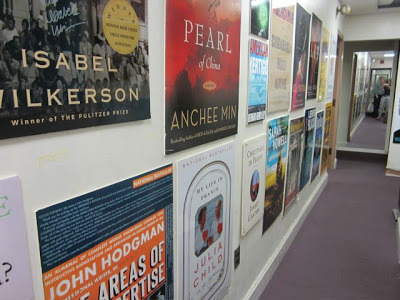

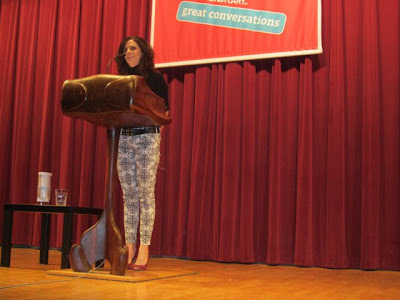
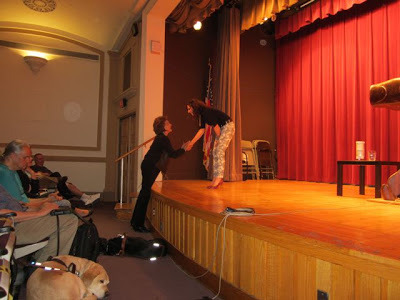
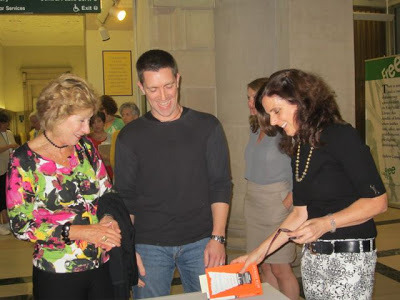
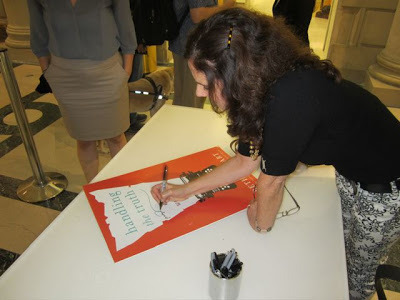
In this case, the photos almost say it all. Except that they can't express my deepest gratitude to the many, many Philadelphians who came out to the Free Library of Philadelphia last night to help me celebrate the launch of Handling the Truth. Together we read and workshopped and talked memoir and truth. Laura Kovacs, an endearing (and quite beautiful) hostess, led my husband and me to the Great Green Room, where I studied the posters of a fraction of the many authors who had gone before me. I could hear the build out there in the auditorium—the room starting to fill. But it wasn't until I pulled back the curtain and saw so many kind faces that my heart (which has been playing tricks on me for weeks) truly surged.
So thank you—Andy Kahan of the Free Library, whose idea this was, and Laura and the entire staff and Joseph Fox Bookstores, which was my first bookstore, when I moved into the city years ago. And thank you, Marciarose Shestack, the first woman in this country to anchor a prime time daily news show in a major market, often surpassing a certain Walter Cronkite in the ratings category. You were a dear friend to my mother. It meant the world to see you out there.
A podcast of this event will be available at the Free Library site.




Published on August 07, 2013 03:22
August 6, 2013
Writing on HuffPo, Blessed by Patty Chang Anker

The storm clouds gather outside my window as I write. My heart does that fast-beating thing. In the midst of this Handling the Truth launch day, I am calmed by the words of a very dear friend, Patty Chang Anker, whose own book, Some Nerve, is set to launch in October, in a wondrous yellow jacket. It's going to soar.
Patty, thank you for reading Handling, and for taking the time, in your own super crazy life, to write about it on this very day. I love your reflections (and you). An excerpt:
HANDLING THE TRUTH draws on her teaching
of creative nonfiction at the University of Pennsylvania - my alma
mater - oh how I wish I could have taken this course way back when! But
now, I can - we all can! Here are writing prompts that will actually
make you want to write, discrete assignments that make a gargantuan task
manageable (Empty your pockets. Choose the thing that matters most.
"Tell me about the irreplaceable by telling your chosen object's
story."). Here are mind-opening exercises like taking a picture and
then zooming in on a piece of the background as the center of your
scene, or listening to a tango (or a sacred chant, or any unfamiliar
music) as a route to memories you didn't remember you had. Here are
examples of great writing by recognized masters and undergraduate
students alike, reminding us credentials are not prerequisites for
rendering an unforgettable story. And perhaps most tantalizing, here is
Beth's reading list, which will likely guide my book purchases for the
foreseeable future.
And since I am here, with Patty, I will share these eight memoir-writing tips I wrote for Huffington Post on the making of memoir. A huge thank you to HuffPo for being part of this celebration party. And, again, thank you, Patty.




Published on August 06, 2013 13:24
The New York Journal of Books Review of Handling the Truth: oh, my!

My cup overfloweth. Such a beautiful, beautiful review of Handling the Truth in the New York Journal of Books. Helen Gallagher, thank you so much. (Oh, it is a sweet, dear thing to be so kindly understood.)
My favorite words, because it is indeed my hope that this book will be helpful to teachers, are here.
Learning to write a powerful memoir requires studying the masters,
finding your form, and getting ready to be vulnerable. How else can you
write with honesty and tell the truth? If you’re ready to “get it right,
when so many get it wrong, you’ll learn to write and write until you
find your true voice.” Ms. Kephart helps you along the way by
explaining what memoir is not, and helps you understand what readers
gain by reading good literature.
Beyond its appeal to eager memoir writers seeking a teacher by their
side, Ms. Kephart’s book allows writing teachers to create custom
classroom reading for students by following the generous reading list
and memoir samples in the book’s Appendix.
Throughout readers are encouraged to be active writers, to write
about what is happening now in order to can learn to write about
yesterday.
Thank you for this. Thank you for the whole, which is here.
Thank you.




Published on August 06, 2013 06:32
Visiting with Marion Roach Smith, and talking about truth telling

Every day, memoir writers have any number of good reasons to celebrate Marion Roach Smith, author of The Memoir Project: A Thoroughly Non-Standardized Text for Writing & Life. She's knowledgeable and she's also generous (a powerful combination), and her blog provides a wealth of insight.
Today I am her lucky guest blogger. I'm writing about truth, here. There's an excerpt of Handling there, and a chance to win a copy.
Marion, this flower opens for you today.




Published on August 06, 2013 06:18
today is the day, the winner is, and thank you, Serena, for this amazing review of Handling the Truth

I took my corporate work outside for an hour yesterday—needed the air, needed to get my heart to stop pounding so hard. This little fellow greeted me. "What the heck are you up to?" he said.
Today I'm up to releasing Handling the Truth: On the Writing of Memoir. I cannot believe this day has finally come. I know that there have been other Beth books before this one—and certainly this book could not have been written without the knowledge I'd gained from writing the memoirs, the poetry, the history, the fiction, too. Still, somehow, Handling feels like the very first book. The jangle of nerves. The hopes. That sense of expectation. Here, in this book, are the things I've learned, the things I've taught, the books I've loved, and the students who inspire me. Also my mother, father, husband, son.
It's all here. Jangles. Tangles. Nerves.
That is one of the reasons I am particularly grateful to Serena Agusto-Cox for helping me celebrate this day with her absolutely beautiful reflections on this book. Serena came to my event in Alexandria, VA, and bought her copy there. She has been gracious ever since, sending me notes as she read through. I know how much time she spent putting together her review, and so, for that reason especially, I encourage you to read it here.
My favorite part:
She shares her favorite places, her favorite music, her favorite
memoirs, and her students’ work, and she begs that anyone interested in
writing memoir do it because the story must be told and is relate-able
to someone outside the self. Writing the genre requires the writer to
be as honest with herself as she can be and to fill the gaps in memory
with facts from documents or cross-referencing conversations and moments
with those that share the memory. Reading this reference memoir is
like getting to know Kephart on a personal level, but it’s also about
getting to know the writer inside you — the one that wants to write the
book but doesn’t know where to start. Although this advice is geared
toward those who wish to write their own personal histories, there is
sage advice for other writers — fiction writers struggling with what
tense to put their book in, for example.
Thank you to all of you who have cheered me on in this endeavor. Thank you to those who will join me this evening at the Free Library of Philadelphia, 7:30, for a reading and workshop. Those who want to know more about the book—or read my students' work, or read about new memoirs I've loved, or see some of the reviews—please visit this dedicated Handling the Truth page.
Finally, a few days ago, I put into motion a Handling contest, asking readers to name their favorite memoirs. Such intriguing titles came forth—everything from Crossing the Moon, Angela's Ashes, Wild, and The Thing About Life is That One Day You'll Be Dead to The Glass Castle, The Sound of a Wild Snail Eating, two Joan Didions, and several mentions of Anne Lamott's Operating Instructions. But the winner, randomly chosen (and not by me) is .... Kim Nastick, who chose Joan Didion's Blue Nights, a book I do write about in Handling.
Kim, send me a note and I'll get you a signed copy.




Published on August 06, 2013 04:44
August 5, 2013
Silence, Please, essaying on the Psychology Today blog

It's okay. I know you wonder. Is Beth Kephart...losing it? I wonder, too. I reflect on the probability, at odd hours of the day and night. And so, when the Creating in Flow blog of Psychology Today magazine invited me to write about process many weeks ago, I wrote about...this. About my need for silence in a crazy-making world. Many thanks to Susan K. Perry for making room for me.
The piece begins like this, below. The whole can be found here.
The lines had started to tangle. I was in danger of winking out, going cold, vanishing.
Snap.
It
was a case of too much. It was a series of scenarios in which I
couldn’t remember names or small events, manage the pairings of nouns
and verbs, or send an email without either losing a word or making one
up (we now have revier, instead of river; celebrait instead of
celebrate).




Published on August 05, 2013 12:04
Going Over: The Berlin Book Cover Reveal

This is one of the most spectacular book covers I've ever seen.
How amazing, therefore, that it will now be associated with a book I wrote—a book that had its beginnings in a trip I took to Berlin and in a conversation I had with the ever-dear Tamra Tuller.
I have Tamra, my editor, to whom this book is dedicated, to thank for seeing this cover through. I have Ginee Seo, Lara Starr, Stephanie Wong, and the entire Chronicle team—for their great enthusiasm and care. And for this gorgeous, thoughtful, it-says-it-all imagery, I have Jennifer Tolo Pierce, the director of design at Chronicle. Jennifer, this is perfection.
This, then, is Going Over, due out from Chronicle next April 1st. I so eagerly anticipate this release.
It
is February 1983, and Berlin is a divided city—a miles-long barricade
separating east from west. But the city isn’t the only thing that is
divided. Ada, almost 16, lives with her mother and grandmother among the
rebels, punkers, and immigrants of Kreuzberg, just west of the wall.
Stefan, 18, lives east with his brooding grandmother in a faceless
apartment bunker of Friedrichshain, his telescope pointed toward
freedom. Bound by love and separated by circumstance, their only chance
lies in a high-risk escape. But will Stefan find the courage to leap?
Will Ada keep waiting for the boy she has only seen four times a year
ever since she can remember? Or will forces beyond their control stand
in their way?
Told in the alternating voices of the pink-haired graffiti artist and
the boy she loves, Going Over is a story of daring and sacrifice, choices
and consequences, and love that will not wait.
“Beth
Kephart has done it again. She’s spun gold out of the language of
longing and has shown us how to make room for miracles. This novel
–about a boy and girl separated by the cruelest of fates–will inspire
any reader to make the leap for love.”
Patricia McCormick, author of National Book Award Finalists Sold and Never Fall Down
“An
unforgettable portrayal of life and love divided. Kephart captures the
beauty and desperation of 1980's Berlin with prose both gripping and
graceful.”
Ruta Sepetys, New York Times bestselling author of Between Shades of Gray and Out of the Easy




Published on August 05, 2013 09:56
Beth asks Beth: A Handling the Truth Interview
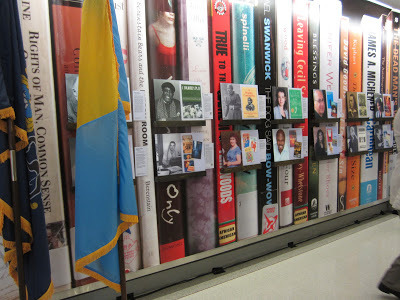
Back in December, I sat down and asked myself a few questions about teaching and truth. I don't know who felt more nervous—the interviewee or the interviewer. But I share the essence of that little just-girls chat below, on the eve of the launch of this book, the galleys for which I have held in my hand for close to a year. I am so eager for tomorrow—eager for the book, eager to celebrate authors I love and the students who inspire me, and eager to see some of you at the Free Library of Philadelphia for a talk and workshop (start time is 7:30 PM).
The Handling the Truth giveaway is still live. More about the contest here. And more about the book here.
<!--
/* Font Definitions */
@font-face
{font-family:Cambria;
panose-1:2 4 5 3 5 4 6 3 2 4;
mso-font-charset:0;
mso-generic-font-family:auto;
mso-font-pitch:variable;
mso-font-signature:3 0 0 0 1 0;}
/* Style Definitions */
p.MsoNormal, li.MsoNormal, div.MsoNormal
{mso-style-parent:"";
margin:0in;
margin-bottom:.0001pt;
mso-pagination:widow-orphan;
font-size:12.0pt;
mso-bidi-font-size:10.0pt;
font-family:"Times New Roman";
mso-ascii-font-family:Cambria;
mso-ascii-theme-font:minor-latin;
mso-fareast-font-family:Cambria;
mso-fareast-theme-font:minor-latin;
mso-hansi-font-family:Cambria;
mso-hansi-theme-font:minor-latin;
mso-bidi-font-family:"Times New Roman";
mso-bidi-theme-font:minor-bidi;}
@page Section1
{size:8.5in 11.0in;
margin:1.0in 1.25in 1.0in 1.25in;
mso-header-margin:.5in;
mso-footer-margin:.5in;
mso-paper-source:0;}
div.Section1
{page:Section1;}
</style>
<style>
<!--
/* Font Definitions */
@font-face
{font-family:Times;
panose-1:2 0 5 0 0 0 0 0 0 0;
mso-font-charset:0;
mso-generic-font-family:auto;
mso-font-pitch:variable;
mso-font-signature:3 0 0 0 1 0;}
@font-face
{font-family:Cambria;
panose-1:2 4 5 3 5 4 6 3 2 4;
mso-font-charset:0;
mso-generic-font-family:auto;
mso-font-pitch:variable;
mso-font-signature:3 0 0 0 1 0;}
/* Style Definitions */
p.MsoNormal, li.MsoNormal, div.MsoNormal
{mso-style-parent:"";
margin:0in;
margin-bottom:.0001pt;
mso-pagination:widow-orphan;
font-size:12.0pt;
mso-bidi-font-size:10.0pt;
font-family:"Times New Roman";
mso-ascii-font-family:Cambria;
mso-ascii-theme-font:minor-latin;
mso-fareast-font-family:Cambria;
mso-fareast-theme-font:minor-latin;
mso-hansi-font-family:Cambria;
mso-hansi-theme-font:minor-latin;
mso-bidi-font-family:"Times New Roman";
mso-bidi-theme-font:minor-bidi;}
p
{margin:0in;
margin-bottom:.0001pt;
mso-pagination:widow-orphan;
font-size:10.0pt;
font-family:"Times New Roman";
mso-ascii-font-family:Times;
mso-fareast-font-family:Cambria;
mso-fareast-theme-font:minor-latin;
mso-hansi-font-family:Times;
mso-bidi-font-family:"Times New Roman";}
@page Section1
{size:8.5in 11.0in;
margin:1.0in 1.25in 1.0in 1.25in;
mso-header-margin:.5in;
mso-footer-margin:.5in;
mso-paper-source:0;}
div.Section1
{page:Section1;}
</style>
<br />
<br />
<div class="MsoNormal">
<span style="color: #cc0000;"><b style="mso-bidi-font-weight: normal;"><span style="color: #cc0000; mso-bidi-font-size: 11.0pt;">What is memoir, and what is
not?</span></b></span><span style="mso-bidi-font-size: 11.0pt;"><br />
<br />
Real memoirists write to discover a life, to understand its meaning, to share
what has been learned, to reach beyond themselves. They do not write to
pronounce, proclaim, accuse, retaliate, lecture, or self glorify. They
leave therapy to the paid professionals. <br />
<br />
<b style="mso-bidi-font-weight: normal;"><span style="color: #cc0000;">Why write a
book like this now? Hasn’t the memoir form morphed and leaked into a catchall
phrase?</span><br />
</b><br />
Yes, HANDLING is a brave endeavor. But what was my choice, really? I
fully believe that memoir, done right, can heal, uplift, and instruct. That
it is an embattled form of community, worthy of defense and explanation. <br />
<b style="mso-bidi-font-weight: normal;"><span style="color: #cc0000;"><br />
Can you really teach someone to write memoir?</span></b><br />
<br />
I believe that you can help aspiring memoirists discover their purpose as
writers, frame their lives against the backdrop of meaningful questions, and
identify and wield the most telling details. I have been amazed by the
engineers who emerge from my classroom as talented and ultimately published young
memoirists. I have been gratified to watch the journeys of young and old
writers—those who weren’t sure at first, and who became sure in time.<br />
<br />
<b style="mso-bidi-font-weight: normal;"><span style="color: #cc0000;">What are the
biggest mistakes memoir writers make? Why does it matter that they get
those things right?</span></b><br />
<br />
So much to say here, and so little room. Perhaps it’s easiest to say
this: Beginning memoirists tend to believe that just because something
happened to them, that something will be of interest to others. But it’s
never the thing that happened that matters most. It’s what has been
learned, and how the learning has been shaped.<br />
<span style="color: #cc0000;"><br />
<b style="mso-bidi-font-weight: normal;">Which memoirs have been most influential
for you?</b></span><br />
<br />
The first memoir I read was Natalie Kusz’s extraordinary <i style="mso-bidi-font-style: normal;">Road Song</i>. I still teach that book, and I still cry when I
read it. <i style="mso-bidi-font-style: normal;">Running in the Family</i>
(Michael Ondaatje), <i style="mso-bidi-font-style: normal;">The Duke of Deception</i>
(Geoffrey Wolff), <i style="mso-bidi-font-style: normal;">Just Kids</i> (Patti
Smith), <i style="mso-bidi-font-style: normal;">Let’s Take the Long Way Home</i>
(Gail Caldwell)—I’m afraid I could go on and on here. As for those who
have written about the making of memoir, I am a giant Patricia Hampl fan and
Vivian Gornick was quite smart in her delineation of the situation and the
story. <br />
<br />
<b style="mso-bidi-font-weight: normal;"><span style="color: #cc0000;">Can you ever
really tell the truth?</span><br />
</b><br />
We can tell our truth. That’s all we’ve got. We know when we start
to exaggerate. We know when we “lie” to make things fit or to make the
story turn out a certain, perfectly symmetrical, deeply self-congratulatory
way. We know when what we write will not resonate with others who have
lived the adventure alongside us. We know what we are doing.<br />
<b style="mso-bidi-font-weight: normal;"><br />
<span style="color: #cc0000;">Do you always hurt someone when you write a memoir?</span></b><br />
<br />
You don’t have to. There are those who haven’t. But goodness, it is
a difficult, dangerous, so slippery slope. We forget that even when we
write out of love and toward love, we can hurt simply by freezing another in
time, by not giving them room to change on the page.<br />
<br />
<b style="mso-bidi-font-weight: normal;"><span style="color: #cc0000;">Why do
beauty and authenticity still matter?</span></b><br />
<br />
How could they not? What do we have without beauty? What can we
trust in the absence of the authentic? What good are we, especially as
writers, if we do not aspire toward both?<br />
</span><span style="color: #cc0000;"><br />
<b style="mso-bidi-font-weight: normal;">What is the difference between memoir
and autobiography?</b></span><br />
<br />
Memoir yearns to understand what a life means. Autobiography merely tells
you, most often in chronological fashion, what happened. The first
celebrates our shared human condition. The second shouts, <i style="mso-bidi-font-style: normal;">Look at me.<br />
</i><b style="mso-bidi-font-weight: normal;"><span style="color: #cc0000;"><br />
What do you ultimately want readers to take away from HANDLING THE TRUTH?</span></b><br />
<br />
I have written this book for both readers and writers, for teachers and
students, for the questing souls out there. If I have to name one single
thing that I hope readers will take away from this (beyond all the books I
recommend and hope they will read), it is this: Truth matters. It can
change a life.<br />
<br />
<b style="mso-bidi-font-weight: normal;"><span style="color: #cc0000;">If you could
recommend one memoir that every aspiring memoirist should read, what would it
be? Why?</span></b><br />
<br />
<i style="mso-bidi-font-style: normal;">Running in the Family</i> by Michael
Ondaatje, because this extraordinary book proves how powerful—and wholly
artistic—memoir can be. <i style="mso-bidi-font-style: normal;">Running</i>
is a poem, a pastiche, a collage, a plot, a confession. It stretches our
idea of the form. It changes every time that we read it, just like life
itself.<br />
</div>
<div class="MsoNormal" style="margin-bottom: .1pt; margin-left: 0in; margin-right: 0in; margin-top: .1pt; mso-para-margin-bottom: .01gd; mso-para-margin-left: 0in; mso-para-margin-right: 0in; mso-para-margin-top: .01gd;">
<b style="mso-bidi-font-weight: normal;"><span style="color: #cc0000; mso-bidi-font-family: "Times New Roman";">What do teachers
of memoir do?</span></b><span style="mso-bidi-font-family: "Times New Roman";"></span></div>
<div class="MsoNormal" style="margin-bottom: .1pt; margin-left: 0in; margin-right: 0in; margin-top: .1pt; mso-para-margin-bottom: .01gd; mso-para-margin-left: 0in; mso-para-margin-right: 0in; mso-para-margin-top: .01gd;">
<br /></div>
<div class="MsoNormal" style="margin-bottom: .1pt; margin-left: 0in; margin-right: 0in; margin-top: .1pt; mso-para-margin-bottom: .01gd; mso-para-margin-left: 0in; mso-para-margin-right: 0in; mso-para-margin-top: .01gd;">
<span style="mso-bidi-font-family: "Times New Roman";">I
have learned the answer to this question over time.<span style="mso-spacerun: yes;"> </span>Teachers of memoir create a safe space for truth
telling.<span style="mso-spacerun: yes;"> </span>They ask the right
questions and generate the kinds of exercises (which may involve cameras, food,
long walks, photographic research) that enable minds to travel backward through
time and to emerge, in the present, with a deepened understanding of both self
and others (and, of course, the world).<span style="mso-spacerun: yes;">
</span>Teachers of memoir suggest the right books to read.<span style="mso-spacerun: yes;"> </span>They listen before they assert.<span style="mso-spacerun: yes;"> </span>They never judge another’s experience,
only help shape it into art.</span></div>
<div class="MsoNormal" style="margin-bottom: .1pt; margin-left: 0in; margin-right: 0in; margin-top: .1pt; mso-para-margin-bottom: .01gd; mso-para-margin-left: 0in; mso-para-margin-right: 0in; mso-para-margin-top: .01gd;">
<br /></div>
<div class="MsoNormal" style="margin-bottom: .1pt; margin-left: 0in; margin-right: 0in; margin-top: .1pt; mso-para-margin-bottom: .01gd; mso-para-margin-left: 0in; mso-para-margin-right: 0in; mso-para-margin-top: .01gd;">
<b style="mso-bidi-font-weight: normal;"><span style="color: #cc0000; mso-bidi-font-family: "Times New Roman";">Is it good, as a
writer, to be and feel vulnerable?</span></b><span style="mso-bidi-font-family: "Times New Roman";"></span></div>
<div class="MsoNormal" style="margin-bottom: .1pt; margin-left: 0in; margin-right: 0in; margin-top: .1pt; mso-para-margin-bottom: .01gd; mso-para-margin-left: 0in; mso-para-margin-right: 0in; mso-para-margin-top: .01gd;">
<br /></div>
<div class="MsoNormal" style="margin-bottom: .1pt; margin-left: 0in; margin-right: 0in; margin-top: .1pt; mso-para-margin-bottom: .01gd; mso-para-margin-left: 0in; mso-para-margin-right: 0in; mso-para-margin-top: .01gd;">
<span style="mso-bidi-font-family: "Times New Roman";">Absolutely.<span style="mso-spacerun: yes;"> </span>Vulnerability is, in many ways, the key
to writing memoir.<span style="mso-spacerun: yes;"> </span>All true
memoirists reckon honestly with the imperfect, the splintered, the flawed.<span style="mso-spacerun: yes;"> </span>All true memoirists are human.</span></div>
<div class="MsoNormal" style="margin-bottom: .1pt; margin-left: 0in; margin-right: 0in; margin-top: .1pt; mso-para-margin-bottom: .01gd; mso-para-margin-left: 0in; mso-para-margin-right: 0in; mso-para-margin-top: .01gd;">
<br /></div>
<div class="MsoNormal" style="margin-bottom: .1pt; margin-left: 0in; margin-right: 0in; margin-top: .1pt; mso-para-margin-bottom: .01gd; mso-para-margin-left: 0in; mso-para-margin-right: 0in; mso-para-margin-top: .01gd;">
<b style="mso-bidi-font-weight: normal;"><span style="color: #cc0000; mso-bidi-font-family: "Times New Roman";">Have we run out of
topics, as memoirists?<span style="mso-spacerun: yes;"> </span></span></b><span style="mso-bidi-font-family: "Times New Roman";"></span></div>
<div class="MsoNormal" style="margin-bottom: .1pt; margin-left: 0in; margin-right: 0in; margin-top: .1pt; mso-para-margin-bottom: .01gd; mso-para-margin-left: 0in; mso-para-margin-right: 0in; mso-para-margin-top: .01gd;">
<br /></div>
<div class="MsoNormal" style="margin-bottom: .1pt; margin-left: 0in; margin-right: 0in; margin-top: .1pt; mso-para-margin-bottom: .01gd; mso-para-margin-left: 0in; mso-para-margin-right: 0in; mso-para-margin-top: .01gd;">
<span style="mso-bidi-font-family: "Times New Roman";">I
might have thought we had run out of topics, but then I started teaching at
Penn.<span style="mso-spacerun: yes;"> </span>The personal stories my
students tell are so original, heartbreaking, and surprising that I just hold
my breath and wait and receive.<span style="mso-spacerun: yes;"> </span></span></div>
<div class="MsoNormal" style="margin-bottom: .1pt; margin-left: 0in; margin-right: 0in; margin-top: .1pt; mso-para-margin-bottom: .01gd; mso-para-margin-left: 0in; mso-para-margin-right: 0in; mso-para-margin-top: .01gd;">
<br /></div>
<div class="MsoNormal" style="margin-bottom: .1pt; margin-left: 0in; margin-right: 0in; margin-top: .1pt; mso-para-margin-bottom: .01gd; mso-para-margin-left: 0in; mso-para-margin-right: 0in; mso-para-margin-top: .01gd;">
<span style="mso-bidi-font-family: "Times New Roman";">A
Muslim-Hindu young man, born in Canada, writes about what it is to become an
American.<span style="mso-spacerun: yes;"> </span>A young woman writes of
watching her best friend die in a tragic accident.<span style="mso-spacerun: yes;"> </span>Another writes of her young obsession with cooking, another
of the loss of a young brother.<span style="mso-spacerun: yes;"> </span>A
young man writes of his struggle with religion, another writes of his obsession
with power training, another writes of the aftermath of a breakup of an
almost-secret relationship, another writes of stepping out into the world as a
gay man, another writes of his love for his mother, another writes of nearly
dying and worrying for his mother’s soul.<span style="mso-spacerun: yes;">
</span>These stories are <i style="mso-bidi-font-style: normal;">sui generis</i>
because they have only been lived once, this specifically, and this
specifically detailed.<span style="mso-spacerun: yes;"> </span></span></div>
<div class="MsoNormal" style="margin-bottom: .1pt; margin-left: 0in; margin-right: 0in; margin-top: .1pt; mso-para-margin-bottom: .01gd; mso-para-margin-left: 0in; mso-para-margin-right: 0in; mso-para-margin-top: .01gd;">
<br /></div>
<div class="MsoNormal" style="margin-bottom: .1pt; margin-left: 0in; margin-right: 0in; margin-top: .1pt; mso-para-margin-bottom: .01gd; mso-para-margin-left: 0in; mso-para-margin-right: 0in; mso-para-margin-top: .01gd;">
<span style="mso-bidi-font-family: "Times New Roman";">Memoir
reminds us of just how significant and particular and ripe with potential each
one of us is.</span></div>
<div class="MsoNormal" style="margin-bottom: .1pt; margin-left: 0in; margin-right: 0in; margin-top: .1pt; mso-para-margin-bottom: .01gd; mso-para-margin-left: 0in; mso-para-margin-right: 0in; mso-para-margin-top: .01gd;">
<br /></div>
<div class="MsoNormal" style="margin-bottom: .1pt; margin-left: 0in; margin-right: 0in; margin-top: .1pt; mso-para-margin-bottom: .01gd; mso-para-margin-left: 0in; mso-para-margin-right: 0in; mso-para-margin-top: .01gd;">
<b style="mso-bidi-font-weight: normal;"><span style="color: #cc0000; mso-bidi-font-family: "Times New Roman";">You have a chapter
titled “Do You Love?” in <i style="mso-bidi-font-style: normal;">Handling the
Truth</i>.<span style="mso-spacerun: yes;"> </span>What’s that about?</span></b><span style="mso-bidi-font-family: "Times New Roman";"></span></div>
<div class="MsoNormal" style="margin-bottom: .1pt; margin-left: 0in; margin-right: 0in; margin-top: .1pt; mso-para-margin-bottom: .01gd; mso-para-margin-left: 0in; mso-para-margin-right: 0in; mso-para-margin-top: .01gd;">
<br /></div>
<div class="MsoNormal" style="margin-bottom: .1pt; margin-left: 0in; margin-right: 0in; margin-top: .1pt; mso-para-margin-bottom: .01gd; mso-para-margin-left: 0in; mso-para-margin-right: 0in; mso-para-margin-top: .01gd;">
<span style="mso-bidi-font-family: "Times New Roman";">It’s
sort of simple, really.<span style="mso-spacerun: yes;"> </span>If we don’t
know what we love, what we’re passionate about, what makes us crazy with
desire, what we yearn for, we’re not ready to write memoir.<span style="mso-spacerun: yes;"> </span>Autobiography, maybe.<span style="mso-spacerun: yes;"> </span>But not memoir.</span></div>
<div class="MsoNormal" style="margin-bottom: .1pt; margin-left: 0in; margin-right: 0in; margin-top: .1pt; mso-para-margin-bottom: .01gd; mso-para-margin-left: 0in; mso-para-margin-right: 0in; mso-para-margin-top: .01gd;">
<br /></div>
<div class="MsoNormal" style="margin-bottom: .1pt; margin-left: 0in; margin-right: 0in; margin-top: .1pt; mso-para-margin-bottom: .01gd; mso-para-margin-left: 0in; mso-para-margin-right: 0in; mso-para-margin-top: .01gd;">
<b style="mso-bidi-font-weight: normal;"><span style="color: #cc0000; mso-bidi-font-family: "Times New Roman";">Is the
first-person pronoun the only way to write memoir?</span></b><span style="mso-bidi-font-family: "Times New Roman";"></span></div>
<div class="MsoNormal" style="margin-bottom: .1pt; margin-left: 0in; margin-right: 0in; margin-top: .1pt; mso-para-margin-bottom: .01gd; mso-para-margin-left: 0in; mso-para-margin-right: 0in; mso-para-margin-top: .01gd;">
<br /></div>
<div class="MsoNormal" style="margin-bottom: .1pt; margin-left: 0in; margin-right: 0in; margin-top: .1pt; mso-para-margin-bottom: .01gd; mso-para-margin-left: 0in; mso-para-margin-right: 0in; mso-para-margin-top: .01gd;">
<span style="mso-bidi-font-family: "Times New Roman";">Isn’t
it great that the answer to this question is no?<span style="mso-spacerun: yes;"> </span>Memoirs come in second person, third person, even graphic
art or photographically assisted formulations—and any manner of variation.<span style="mso-spacerun: yes;"> </span>I’m very insistent that my students
find their right truth-telling form.<span style="mso-spacerun: yes;">
</span>I ask them to read memoirists like Mark Richard, Dorothy Allison, and
Alison Bechdel before they go too far.</span></div>
<div class="MsoNormal" style="margin-bottom: .1pt; margin-left: 0in; margin-right: 0in; margin-top: .1pt; mso-para-margin-bottom: .01gd; mso-para-margin-left: 0in; mso-para-margin-right: 0in; mso-para-margin-top: .01gd;">
<br /></div>
<div class="MsoNormal" style="margin-bottom: .1pt; margin-left: 0in; margin-right: 0in; margin-top: .1pt; mso-para-margin-bottom: .01gd; mso-para-margin-left: 0in; mso-para-margin-right: 0in; mso-para-margin-top: .01gd;">
<b style="mso-bidi-font-weight: normal;"><span style="color: #cc0000; mso-bidi-font-family: "Times New Roman";">You have written
eight acclaimed novels for young adults and have two more set to launch.<span style="mso-spacerun: yes;"> </span>Yet you teach memoir at Penn.<span style="mso-spacerun: yes;"> </span>Why?<span style="mso-spacerun: yes;"> </span>Why not teach writing for children?</span></b><span style="mso-bidi-font-family: "Times New Roman";"></span></div>
<div class="MsoNormal" style="margin-bottom: .1pt; margin-left: 0in; margin-right: 0in; margin-top: .1pt; mso-para-margin-bottom: .01gd; mso-para-margin-left: 0in; mso-para-margin-right: 0in; mso-para-margin-top: .01gd;">
<br /></div>
<div class="MsoNormal" style="margin-bottom: .1pt; margin-left: 0in; margin-right: 0in; margin-top: .1pt; mso-para-margin-bottom: .01gd; mso-para-margin-left: 0in; mso-para-margin-right: 0in; mso-para-margin-top: .01gd;">
<span style="mso-bidi-font-family: "Times New Roman";">I
get asked this question a lot.<span style="mso-spacerun: yes;"> </span>I
write novels for young adults because my students remind me, again and again,
of just how intelligent they are, how searching, how open to new kinds of
stories, how deserving of them.<span style="mso-spacerun: yes;"> </span>I
write novels for young adults because I believe, so firmly, in the imagination
of the young, in its generosity.<span style="mso-spacerun: yes;"> </span>I
love to write the teen story that transcends—that speaks to every generation.</span></div>
<div class="MsoNormal" style="margin-bottom: .1pt; margin-left: 0in; margin-right: 0in; margin-top: .1pt; mso-para-margin-bottom: .01gd; mso-para-margin-left: 0in; mso-para-margin-right: 0in; mso-para-margin-top: .01gd;">
<br /></div>
<div class="MsoNormal" style="margin-bottom: .1pt; margin-left: 0in; margin-right: 0in; margin-top: .1pt; mso-para-margin-bottom: .01gd; mso-para-margin-left: 0in; mso-para-margin-right: 0in; mso-para-margin-top: .01gd;">
<span style="mso-bidi-font-family: "Times New Roman";">But
I feel I have a responsibility, as one who has also written and studied memoir,
to teach these young minds what happens when you begin to frame a true story,
when you begin to speak truthfully about yourself.<span style="mso-spacerun: yes;"> </span>There are a whole lot of ways to get “truth telling”
wrong.<span style="mso-spacerun: yes;"> </span>And there can be
consequences even when you get it right.<span style="mso-spacerun: yes;">
</span>If I can protect somehow, if I can caution, if I can help my students
live their real lives with even greater integrity, then that is what I am drawn
to do.<span style="mso-spacerun: yes;"> </span></span></div>
<div class="MsoNormal" style="margin-bottom: .1pt; margin-left: 0in; margin-right: 0in; margin-top: .1pt; mso-para-margin-bottom: .01gd; mso-para-margin-left: 0in; mso-para-margin-right: 0in; mso-para-margin-top: .01gd;">
<br /></div>
<div class="MsoNormal" style="margin-bottom: .1pt; margin-left: 0in; margin-right: 0in; margin-top: .1pt; mso-para-margin-bottom: .01gd; mso-para-margin-left: 0in; mso-para-margin-right: 0in; mso-para-margin-top: .01gd;">
<span style="mso-bidi-font-family: "Times New Roman";">It’s
hard to put into words just how much I love my students.<span style="mso-spacerun: yes;"> </span>I feel I can serve them best by
teaching memoir, on the one hand, and by writing stories that I hope will help
broaden their worlds, on the other.</span></div>
<div class="MsoNormal" style="margin-bottom: .1pt; margin-left: 0in; margin-right: 0in; margin-top: .1pt; mso-para-margin-bottom: .01gd; mso-para-margin-left: 0in; mso-para-margin-right: 0in; mso-para-margin-top: .01gd;">
<br /></div>
<div class="MsoNormal" style="margin-bottom: .1pt; margin-left: 0in; margin-right: 0in; margin-top: .1pt; mso-para-margin-bottom: .01gd; mso-para-margin-left: 0in; mso-para-margin-right: 0in; mso-para-margin-top: .01gd;">
<span style="mso-bidi-font-family: "Times New Roman";">Basically,
I’m privileged to live in both worlds.</span></div>
<div class="MsoNormal" style="margin-bottom: .1pt; margin-left: 0in; margin-right: 0in; margin-top: .1pt; mso-para-margin-bottom: .01gd; mso-para-margin-left: 0in; mso-para-margin-right: 0in; mso-para-margin-top: .01gd;">
<br /></div>
<br />
<br />
<br /><div class="feedflare">
<a href="http://feeds.feedburner.com/~ff/BethK... src="http://feeds.feedburner.com/~ff/BethK..." border="0"></img></a> <a href="http://feeds.feedburner.com/~ff/BethK... src="http://feeds.feedburner.com/~ff/BethK..." border="0"></img></a> <a href="http://feeds.feedburner.com/~ff/BethK... src="http://feeds.feedburner.com/~ff/BethK..." border="0"></img></a> <a href="http://feeds.feedburner.com/~ff/BethK... src="http://feeds.feedburner.com/~ff/BethK..." border="0"></img></a>
</div>
Published on August 05, 2013 03:15
August 4, 2013
Star Tribune reviews Handling the Truth
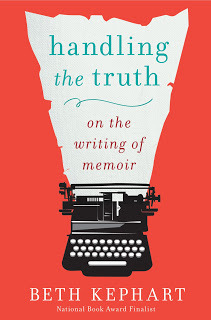
How lucky am I?
Thank you, Meganne Fabrega, for this heartening review of Handling the Truth in today's Star Tribune.
Grateful doesn't begin to describe me, at this moment in time (relieved is another word). And thank you, Serena Agusto-Cox, for letting me know.
The full review is here. One gesture below. And don't forget to enter for your chance to win a copy of the book—and to extend the conversation about memoir; more about that here.
At first glance her writing style may appear to be
casual, but her advice for the memoir writer is deadly serious.
“Careful, now,” she says to her class, and to her reader, as they start
down the path of writing about their lives. There are many cautions like
this along the way, because, “Writing is not a task; it is no job.
Writing is a privilege.”
One of the qualities that make Kephart the
perfect author for a book like this is that she considers herself not
only a teacher, but a lifelong student. “I blame Natalie Kusz,” she
writes, citing Kusz’s memoir “Road Song” as her earliest foray into
memoir. She quotes heavily throughout the book from writers she
continues to learn from, whether it is one of her own novice students or
those she considers masters of the craft, such as Patricia Hampl or
Sven Birkerts.




Published on August 04, 2013 06:46
Handling the Truth: Get Your Copy, Free
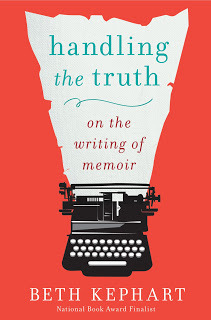
Here, in this amazing, one-time-only deal, Beth Kephart (whom Kelly Simmons calls a Jedi Master, and that's praise enough for me) is offering One Free Copy (note the All Caps) of Handling the Truth to some fortunate United States dwelling soul.
All The Fortunate has to do is type the name of his/her favorite memoir (gotta be sure it's an actual memoir) into the comment box here. On August 6th, I will ask my favorite child to choose a number. That number will be linked, indelibly, to the giftee.
So, go at it, folks. You have until midnight, August 5th. On August 6th, Handling Launch Day, I'll reveal the winner here (and list and comment upon your favorite memoirs).
I'd love it if you spread word, in the meantime, about this book—my return, after so many years, to writing for adults. And I'd love, too, to see you sometime. Some of my upcoming events are listed below. My first official event is at the Free Library of Philadelphia, this coming Tuesday, where I'll be talking and workshopping and maybe even dancing, if there is wine enough. Jilly and Joy and Chippy are promising to be there. You doubt me? Here's proof.
All right. The floor is yours.
August 6, 2013, 7:30
Launching Handling the Truth
with a memoir workshop
Free Library of Philadelphia
Philadelphia, PA
August 8, 2013, Noon
Reflecting on the Great George Childs
(and Dr. Radway)
Ardmore Rotary Club
Merion Cricket Club
Haverford, PA
August 13, 2013, 7 - 10 PM
Philly Writes: One Night, Four Authors
(Jon McGoran, Bee Ridgway, James Kimmel, Jr., Beth Kephart)
Reform Congregation Keneseth Israel
Elkins Park, PA
August 30/August 31 2013
Decatur Book Festival
Appearing with Stacey D'Erasmo
Conducting memoir workshop
Atlanta, GA
Details on the Writers Conference here.
September 7, 2013, 10 AM - noon
BookPassage Memoir Workshop
51 Tamal Vista Blvd.
Corte Madera, CA 94925
September 7, 2013, 3 PM
Books Inc. Memoir Workshop
Opera Plaza
601 Van Ness
San Francisco, CA
September 8, 2013
Redwood Writers Workshop
Memoir Workshop
Flamingo Conference Resort and Spa
Santa Rosa, CA 95405
September 17, 2013, 7 PM
Dr. Radway Launch
Radnor Memorial Library
Radnor, PA
September 22, 2013
Chestnut Hill Book Festival
Chestnut Hill, PA
(details to come)
October 3, 2013, 6 PM
University of Pennsylvania Bookstore
Memoir Workshop/Handling the Truth
Philadelphia, PA
October 10, 2013
Bryn Mawr College
Elizabeth Mosier's Writing for Children Class
(Dr. Radway)
Bryn Mawr, PA
October 19, 2013
Big Blue Marble Bookstore
Reading with Liz Rosenberg
Philadelphia, PA
October 20, 2013
Memoir Festival
Rosemont College
Rosemont, PA
(details to come)
November 9, 2013, 9 AM to Noon
Bank Street Writers Lab Mini-Conference: The Nitty-Gritty
Opening Keynote: Beth Kephart on the teaching of truth
In a half-day program featuring an esteemed panel of reviewers and a study of mentor texts
Bank Street College of Education
610 West 112th Street
New York, NY 10025
March 12, 2014, 8 PM
Elizabeth Boatwright Coaker Visiting Writers Series
Converse College
Spartanburg, SC




Published on August 04, 2013 04:34



